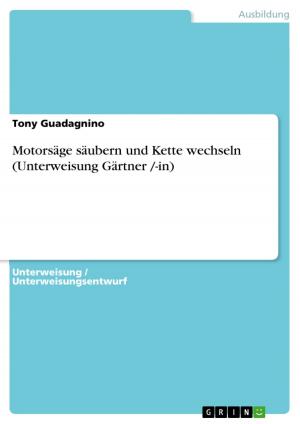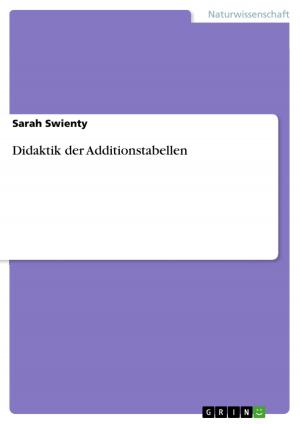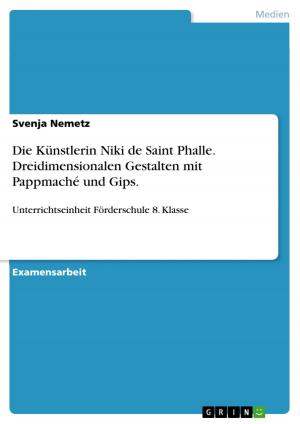Anglicisms in the German Newsmagazines 'FOCUS' and 'Der Spiegel'
A Comparison Dealing with the Quantity, Word Classes and the Context of Anglicisms in the Two Newsmagazines
Nonfiction, Entertainment, Drama, Anthologies| Author: | Katharina Hirmer | ISBN: | 9783656262992 |
| Publisher: | GRIN Verlag | Publication: | August 24, 2012 |
| Imprint: | GRIN Verlag | Language: | English |
| Author: | Katharina Hirmer |
| ISBN: | 9783656262992 |
| Publisher: | GRIN Verlag |
| Publication: | August 24, 2012 |
| Imprint: | GRIN Verlag |
| Language: | English |
Seminar paper from the year 2011 in the subject English Language and Literature Studies - Linguistics, grade: 1,7, University of Regensburg (Institut für Anglistik und Amerikanistik), course: Hauptseminar Language Contact, language: English, abstract: The subject of English influencing the German language has become more and more obvious in the last decades, particularly in the last few years. The Deutsche Bahn (DB) is a very graphic example for this language fashion. You buy your 'Tickets' there at the 'Counter' next to the 'Service Point' and after you have taken the 'City Night Liner', you can rent a bike from the 'Call a Bike' program after having made a short rest in the 'DB Lounge'. But there occurred a lot of misunderstandings because of the new short term parking lots in front of railroad stations called 'Kiss&Ride' in January 2010. So the chairman of the DB Rüdiger Grube finally decided to reduce the amount of anglicisms at the DB in February 2010. 'Counters' turned again into 'Schalter', 'Tickets' into 'Fahrkarten', 'Call a Bike' is now called 'Mietradservice der Deutschen Bahn' again, only established and well known terms like 'Bahncard' and 'Intercity' stayed the same. Thus, English has obviously a huge bearing on the German language, especially in the field of facilities and advertising and, above all, on youth language. You would definitely find a lot of anglicisms in youth literature, youth magazines or youth series on TV. You only have to glance at the cover of the BRAVO: headings like 'Coole Ansage an seine Hater', 'Neues Game: Star-Memory', 'Romantische Dates' or 'Kuscheln im Tourbus' are not a rarity. But how does this phenomenon look for example in German highbrow newsmagazines with the average German newsmagazine readership? To find this out, I have chosen two very popular German newsmagazines, the FOCUS and Der Spiegel since the two of them represent pretty much the German highbrow newsmagazines. I was interested in the question whether these two magazines also represent the mainstream fashion of using many anglicisms in their articles or not. As there have already been a couple of studies on this topic, especially concerning anglicisms in Der Spiegel, there is also enough comparative data to refer to. The latest work, Alexander Onysko's 'Anglicisms in German', about anglicisms in Der Spiegel was published in 2007, so it's really interesting to compare the results of this study with the data of this book to see possible changes or similarities.
Seminar paper from the year 2011 in the subject English Language and Literature Studies - Linguistics, grade: 1,7, University of Regensburg (Institut für Anglistik und Amerikanistik), course: Hauptseminar Language Contact, language: English, abstract: The subject of English influencing the German language has become more and more obvious in the last decades, particularly in the last few years. The Deutsche Bahn (DB) is a very graphic example for this language fashion. You buy your 'Tickets' there at the 'Counter' next to the 'Service Point' and after you have taken the 'City Night Liner', you can rent a bike from the 'Call a Bike' program after having made a short rest in the 'DB Lounge'. But there occurred a lot of misunderstandings because of the new short term parking lots in front of railroad stations called 'Kiss&Ride' in January 2010. So the chairman of the DB Rüdiger Grube finally decided to reduce the amount of anglicisms at the DB in February 2010. 'Counters' turned again into 'Schalter', 'Tickets' into 'Fahrkarten', 'Call a Bike' is now called 'Mietradservice der Deutschen Bahn' again, only established and well known terms like 'Bahncard' and 'Intercity' stayed the same. Thus, English has obviously a huge bearing on the German language, especially in the field of facilities and advertising and, above all, on youth language. You would definitely find a lot of anglicisms in youth literature, youth magazines or youth series on TV. You only have to glance at the cover of the BRAVO: headings like 'Coole Ansage an seine Hater', 'Neues Game: Star-Memory', 'Romantische Dates' or 'Kuscheln im Tourbus' are not a rarity. But how does this phenomenon look for example in German highbrow newsmagazines with the average German newsmagazine readership? To find this out, I have chosen two very popular German newsmagazines, the FOCUS and Der Spiegel since the two of them represent pretty much the German highbrow newsmagazines. I was interested in the question whether these two magazines also represent the mainstream fashion of using many anglicisms in their articles or not. As there have already been a couple of studies on this topic, especially concerning anglicisms in Der Spiegel, there is also enough comparative data to refer to. The latest work, Alexander Onysko's 'Anglicisms in German', about anglicisms in Der Spiegel was published in 2007, so it's really interesting to compare the results of this study with the data of this book to see possible changes or similarities.















